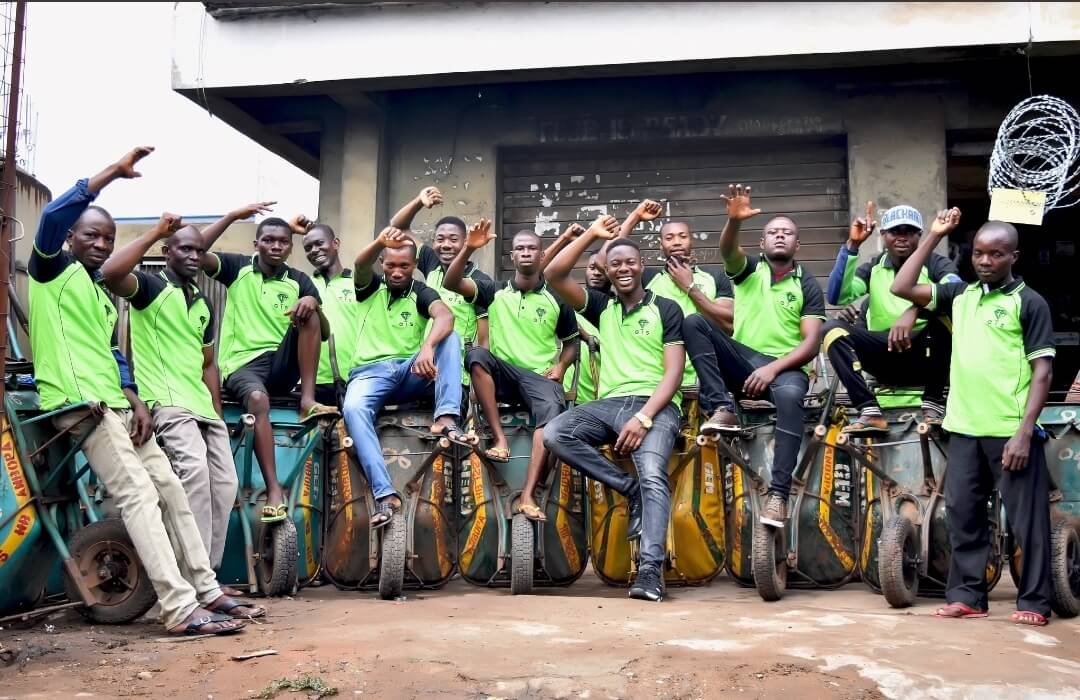Each time Chukwuma Eze returned home from where he worked as an apprentice in Delta State, one thought ran through his mind: how to become a big-time entrepreneur and his own boss.
Back in 2016, he was 20 years old, working for Stanley Enujuba, a man who ran a plumbing business. Eze had lost his father years before then, and because there was no money, he could not further his education after secondary school.
As an apprentice, part of his responsibility was to go to Abraka Market in Asaba every Saturday to buy two old layer chickens and have them processed for his master’s family consumption.
While he waited as the chickens were being processed at the market, he often spent time with Boniface Onyebuchi, a man who had a grocery store there, discussing prospects for success.
“Part of what we always talked about was how to make money,” 26-year-old Eze said. “Boniface was way older than me, but we developed a deep respect for each other.”
One Saturday in 2016, [Boniface] Onyebuchi suggested to Eze that they could partner to start a wheelbarrow rental business around the popular Onitsha Market in neighbouring Anambra State to create jobs and profit.
Rising unemployment
Data from the National Bureau of Statistics shows that Nigeria’s unemployment rate has risen to 33.3%, meaning 23.2 million of the about 70 million people who should be working in Nigeria are out of work.
As good-paying jobs become scarcer, many Nigerians take to menial high-energy-exerting activities to survive. Using wheelbarrows to carry people’s goods at markets and parks at a fee is one of many menial jobs some young Nigerians resort to, even though it is sometimes regarded as jobs for touts and the lowly. First, one needs to own a wheelbarrow and register with the local association of wheelbarrow pushers at his choice market or park.
One wheelbarrow costs between N16,000 and N25,000 ($39 and $61), but in a country where about 39% of the population lives in extreme poverty, not all who desire to start pushing wheelbarrows for a living can afford to buy one. The alternative is usually to rent a wheelbarrow for a daily fee.
Making wheelbarrow pushing attractive
Eze accepted Onyebuchi’s call for partnership and bought five Wheelbarrows while Onyebuchi bought one. They registered the six with the Anambra State Barrow Owners & Pushers Association and started the business.
“I bought and built each one for N35,000 ($136), that is 175,000 ($681) for five and paid N107,000 ($416) to have them registered at the association,” Eze said. “We discovered that wheelbarrows had a lot of use in the Onitsha Market: It could carry goods to places inside the market where cars cannot get to and bring them out.”
Eze combined his apprenticeship with the business, which they named GEMDECONQ (meaning “Gem the conqueror”, Gem being Eze’s nickname). They got six people to rent the wheelbarrows paying N300 ($1.2) per day for each or N1,500 ($6) every week – Monday to Friday. They had decided to let go of Saturdays so the workers could earn extra for themselves, which made the workers more interested in the business.
They gave their workers branded T-shirts to make the business appealing and professional, and their wheelbarrows were branded too. They also organised seminars and trained the workers to be polite and conduct themselves appropriately while working.
“We wanted to build a good reputation for our brand because we knew that would attract people to us and give us more income,” Eze said. “We marketed them as polite, professional pushers to the market to encourage people to always patronise them.”
It worked. Patronage soared, and Eze increased his wheelbarrows to 21, making over N126,000 ($490) monthly. Onyebuchi also increased his to three but later left the business in 2019 after he got admission into a college of education and had no spare time to manage his wheelbarrows.
More money was also coming to the pushers, and soon, some were able to save enough money to venture into other less-energy-sapping but rewarding businesses to improve their standard of living. Among them was Chibuike Amaechi, who now owns a commercial tricycle he bought from working with Eze’s GEMDECONQ.
“I started pushing Wheelbarrow at the Onitsha head bridge before I met GEMDECONQ,” Amaechi said. “I worked hard for four years before I was able to save up and buy the tricycle”.
Managing people is hard
Despite the gains, Eze said some workers are greedy and do not pay in time at the end of the week or daily as expected.
“I always have to call them to pay their money,” he explained. “Sometimes, they just pay half. It is hard managing the people, especially when most of them are older than you are.”
He also said he had lost some wheelbarrows because some workers refused to bring them back to the office at the end of each day as agreed.
“On several occasions, we have traced some of the wheelbarrows and got them back,” he said. “But we have lost two”.
Now he wants to venture into other businesses with the money he has made. And he hopes to turn the wheelbarrow rental into an interstate transportation company with a fleet of cars someday.
General economic realities and perception
As expected, an average Nigerian does not see wheelbarrow-pushing or other menial jobs involving tools that require much energy to use as capable of meaningfully contributing to the long-term growth of the labourer and the economy.
That is why in January 2021, Kogi State’s Governor Yahaya Bello became a subject of criticism on social media after he was reported to have distributed dozens of wheelbarrows and shovels to unemployed youths in the state as a form of empowerment.
Nigerians and civil society groups took to Twitter to blast the governor for his lack of creativity in giving wheelbarrows and shovels to youths as empowerment instead of helping them get valuable skills for sustainable livelihood and wealth creation.
They said the governor was promoting poverty and retrogression as wheelbarrows for menial jobs would hardly earn beneficiaries up to the national N30,000 minimum wage in the face of skyrocketing food prices, inflation and widening poverty rate.
But increased patronage stemming from Eze’s branding, unique marketing, and training meant his pushers operated beyond the average wheelbarrow pusher and could get beyond the monthly minimum wage.
For example, on a good day, 18-year-old Nwaigbo Chigozie earns N3,000 pushing one of Eze’s wheelbarrows, and on a bad day, he makes N1,500. That is about N90,000 or N45,000 monthly. Chigozie said he meaningfully contributes to his family with the return, but he hardly has enough extra to save.
“Saving up money is a problem for me, especially given that prices of things in the market have gone up. I must keep struggling till I am able to make enough money,” he said.
Like Chigozie, 20-year-old Ezekiel Nnamdi, who has pushed wheelbarrows for four years, said: “It has not been easy trying to save because I have to eat and settle some family issues. As soon as I can get money to start my vulcaniser business, I will stop pushing wheelbarrows,” because it is stressful.
Chukwuma Eze, a 20-year-old apprentice in Delta State, dreamed of becoming an entrepreneur. In 2016, he partnered with Boniface Onyebuchi to start a wheelbarrow rental business in Onitsha Market, Anambra State. Both Eze and Onyebuchi invested in and registered six wheelbarrows, which they rented out for a daily fee, incorporating professional branding and worker training to enhance their business’s reputation.
The business, named GEMDECONQ, succeeded, growing to 21 wheelbarrows and generating substantial income. This helped some workers, like Chibuike Amaechi, save enough to start other businesses. However, Eze also faced challenges in managing payments and occasionally lost wheelbarrows due to worker negligence.
Eze aims to expand the business into a transportation company. Despite societal perceptions, the venture overall provided meaningful employment and improved financial prospects for its workers amid Nigeria’s rising unemployment and economic hardship.






